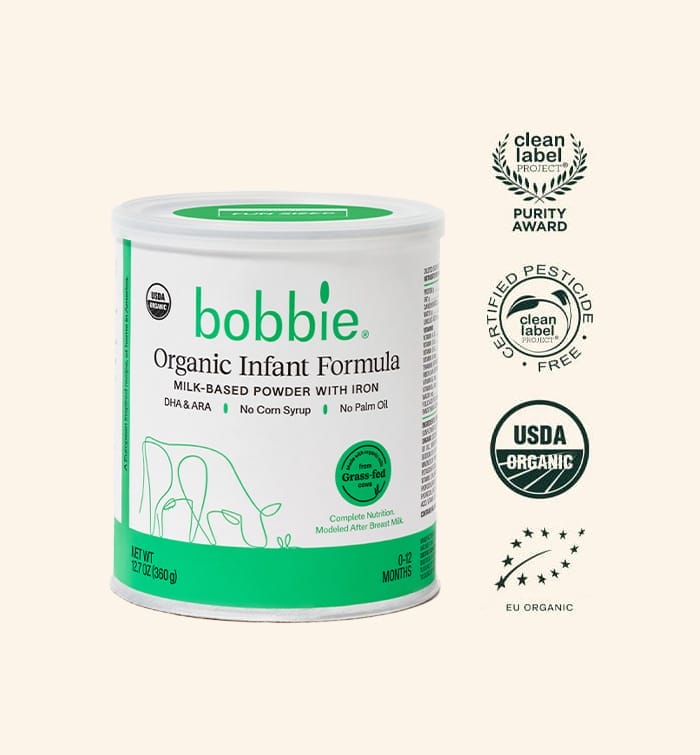We are proud to say that these posts are not sponsored. Our editorial team of Bobbie moms and writers personally select each featured product. If you buy something through our links, we may earn an affiliate commission, at no cost to you.
Having a newborn is exciting! Yes, it is also a lot of work, we know, but the excitement and feeling of joy should quash all that. Although, you may also be worried and wondering how to do things and what you actually need to do, especially in your first month.
If one of your questions is how much should you feed a one-month-old baby, we’ve got you covered! We even have a Formula Feeding 101 Handbook to share thanks to The Formula Mom.
Many new moms are often concerned about how to feed their newborns and how much they should feed them. While this question applies to breastfeeding and formula feeding moms, we will get into the formula feeding aspect first and briefly share some pointers about breastfeeding. You can also expect some great tips for feeding at the end.
How Much Should You Feed a One-Month-Old Baby?
A good rule of thumb is to feed your one-month-old baby one to three ounces of formula every two to three hours. Overall, infants who haven’t started solids will consume about 2 ounces of formula per pound of body weight in a 24-hour period.
Now this answer is not set in stone. The right amount of organic baby formula for your infant can vary based on many reasons, and we will share a few of those reasons with you below.
Individual Differences
The beauty in babies, and humans, in general, is that we are unique in so many ways. All babies feed yes, but how and when they feed can and will vary.
One baby may take only two ounces of formula, while the other takes three or even four ounces. It’s all about your baby’s appetite and unique needs.
Therefore, you must monitor your baby for signs of hunger and ensure that they are feeding at their pace while you are using this data only as a guide.
Your Health Care Team’s Advice
With your newborn, you will have regular healthcare appointments. These routine visits are mostly for checking in and monitoring your baby’s growth within the first month.
During your visits, your pediatrician will examine your baby and make specific recommendations.
If your baby’s weight is moving too fast or too slow according to the growth chart, your doctor may recommend more or less formula to adjust your feeding routine to meet the baby’s needs.
This information will be specific to your baby and your situation, and often it trumps any other recommendations given.
What If I’m a Breast-Feeding Mom?
As a breastfeeding mom, you still may want to know how much should you feed a one-month-old baby. That is perfectly normal, and we will touch briefly on it so that you can have a good guide to follow.
It is estimated that feeding should take 20-40 minutes for babies feeding directly from the breast. In this case, that is how you would measure how much you should feed your breastfed baby. Time and volume are two different things. This doesn’t make sense.
As a breastfeeding mom, you do have the option of bottle-feeding breast milk. If you are bottle-feeding breastmilk, then one to three ounces every two to three hours is a good guideline.
When Should I Feed My Newborn?
Many parents feed their babies on a schedule, although some prefer to feed on demand. Feeding on demand is the practice of initiating feedings when you notice your baby’s hunger cues and continuing the feeding session until your infant is satisfied.
Your baby’s cues can be a hungry cry, nuzzling against your breasts, opening their mouth, lip-smacking, or hand sucking, amongst other things.
You will also always have your pediatrician to run specific questions by. Try to ensure that you communicate with your pediatrician and share your concerns regularly.
Whether you schedule feedings or choose to feed on demand, feeding every two to three hours is the general guide to feeding at one month of age.
Tips for Formula Feeding
Because your baby’s feeding habits may change slightly from day to day, finding a feeding schedule that works may seem tough. When it comes to feeding within the first few months, these tips may prove helpful to you.

Shop Bobbie Organic Infant Formula
Bobbie Organic Infant Formula is a USDA Organic, EU-style infant formula that meets all FDA requirements. It is a complete nutrition milk-based powder modeled after breast milk and is easy on tummies. It is non-GMO and doesn't have corn syrup, palm oil, or maltodextrin. Learn more about Bobbie.
Be Flexible
Of course, in moderation. You must maintain some form of flexibility within your feeding journey and overall parenting journey. This may change often, and it may seem as though one day your baby only takes two ounces, and the next they take three. That is perfectly normal, and you should keep room for some of those changes and growth.
Keep a Baby Feeding Journal
One of the most helpful things new moms can do is to keep a feeding journal. A baby feeding journal will come in handy at several points in your child’s life.
- It Can Be Used to Help You Monitor Progress: Many moms love to see the growth that their newborns are experiencing on paper, and a feeding journal or apps will help you to make those documentations.
- It Can Be Used to Track Reactions: Some things you may want to keep track of how your baby responds to specific formulas or even diapers. A feeding journal is a great way to make these critical notes.
- You Can Use a Feeding Journal to Schedule: If you need to schedule feeding, pump sessions, or time to make your organic baby formula, then a journal will prove handy.
- To Keep Notes For Your Pediatrician Visit: If you ever want to keep a running list for questions or baby monitoring, you’ll find the journal extremely useful.
Make a Fresh Batch of Formula Every Day
Formula-fed babies mustn’t be fed formula that is more than 24 hours old. Some moms choose to make the required amount of formula for the day at once to save time. With this, many accept the fact that one or two bottles may go unused and will be discarded. If that is okay with you then this may be a great tip.
It is also true that You should also discard formula left for over an hour unrefrigerated. Staying on top of these things will help you to keep your baby healthy, satisfied, and happy.
Choose the Right Formula for Your Baby
Knowing what the right formula for your baby is is not an easy task. If you are to choose the right formula, it means that you must read the ingredients list. We highly recommend that you read the ingredients list of your infant formula and ensure that you are comfortable with the ingredients.
Whether you’re choosing to supplement your breastfeeding with formula or exclusively formula feeding, you want to be sure that your bottle-fed baby is getting all of the vitamins, nutrients, and protein they need to thrive.
Of course, running things by your pediatrician is always a great idea.
Ask For Help When You Need It
Many new moms may be afraid to ask for help, but we recommend that you ask if you need it. Asking for help is a great way to prevent burnout as a new mom. Being a parent is hard, and it is entirely okay to get some help or even take a break.
If you are bottle feeding then you can get help with feeding the baby. You can prepare the baby formula to your specification then leave it stored correctly in the refrigerator for your spouse, or family to access. This way, you can catch up on any missed sleep or even just a girl’s day.
Let’s Summarize!
These first days of life are such a magical time, but it’s normal to feel a little overwhelmed amongst the wet diapers, naps, and cluster feeds.
Wondering how much should you feed a one month old baby is quite a common question. It is recommended to feed about one to three ounces of formula every two to three hours. If this seems like a lot, remember that your little one is still too young to eat solid foods.
Once your little one is old enough to eat baby foods like cheese, crackers, and yogurt, their formula needs will decrease. Until then, rest assured you’re doing everything you need to ensure your baby gets the nutrition they need.
However, to remember one to three ounces every two to three hours are just general guidelines. Your baby can eat more or less, and that is entirely okay. Many things may affect how much your baby eats, such as individual differences, medical advice, and formula brand recommendations.
It is also important that you feed your baby on demand as they know when they wish to eat. Along with that, some other tips for feeding include keeping a journal to track your progress and relevant information, choosing a good brand of organic baby formula, making new formula every 24 hours, and asking questions whenever needed.
Your team is here for you! Enjoy your newborn and this incredible feeding journey.

Shop Bobbie Organic Infant Formula
Bobbie Organic Infant Formula is a USDA Organic, EU-style infant formula that meets all FDA requirements. It is a complete nutrition milk-based powder modeled after breast milk and is easy on tummies. It is non-GMO and doesn't have corn syrup, palm oil, or maltodextrin. Learn more about Bobbie.
Sources:
Amount and Schedule of Formula Feedings | Healthy Children
Signs Your Child is Hungry or Full | CDC
How Many Ounces Should a Newborn Eat? | Healthline

